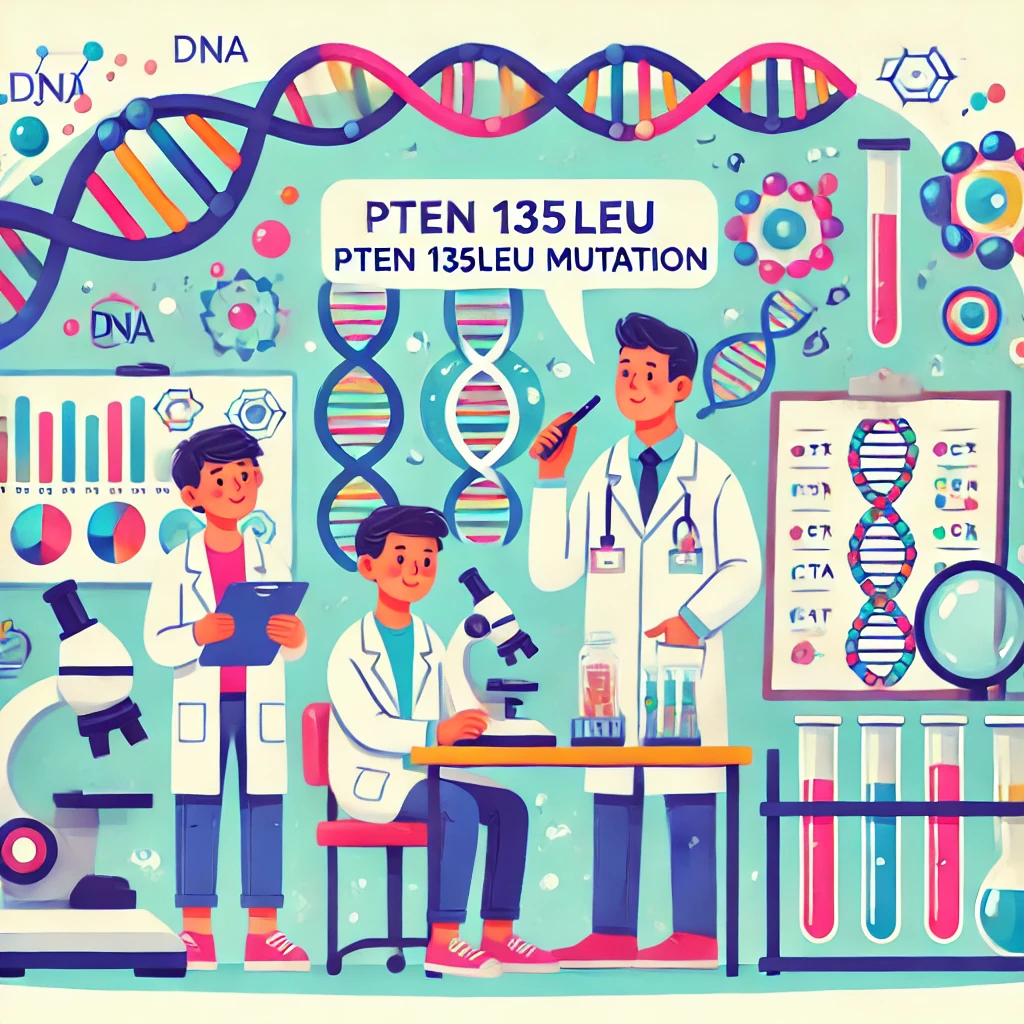Blog
PTEN 135Leu and the Contributions of Wynshaw-Boris: Exploring Genetic Mutations and Developmental Disorders

The PTEN gene has become an essential focal point in the field of medical genetics, particularly when it comes to understanding tumor suppression, cellular signaling, and neurodevelopmental abnormalities. Among the myriad mutations studied within the PTEN gene, the PTEN 135Leu variant stands out as particularly notable for its impact on cellular behavior. This blog post will explore the PTEN 135Leu mutation, its functional implications, and the contributions made by Dr. Wynshaw-Boris in understanding the complex mechanisms behind PTEN mutations and their role in human health.
Understanding PTEN and Its Biological Role
The PTEN (Phosphatase and Tensin Homolog) gene is one of the most important tumor suppressor genes in the human body. Located on chromosome 10q23, PTEN encodes a dual-specificity phosphatase that plays a critical role in regulating cell growth, proliferation, migration, and survival. PTEN exerts its tumor-suppressive function by dephosphorylating phosphatidylinositol-3,4,5-triphosphate (PIP3), thereby antagonizing the PI3K/AKT signaling pathway. This pathway is instrumental in controlling various cellular activities, including cell cycle progression and apoptosis. Dysregulation of the PI3K/AKT pathway is often implicated in oncogenesis, making PTEN a key player in preventing the uncontrolled growth of cells.
PTEN’s role in maintaining cellular homeostasis extends beyond cancer prevention. It has been implicated in embryonic development, neuronal function, and metabolic regulation. In particular, mutations in the PTEN gene are linked to several syndromic conditions collectively known as PTEN Hamartoma Tumor Syndrome (PHTS). Such syndromes include Cowden Syndrome, Bannayan-Riley-Ruvalcaba Syndrome, and Proteus Syndrome, all of which feature hamartomas and an increased risk of cancer.
PTEN 135Leu: A Specific Mutation with Profound Consequences
The PTEN 135Leu mutation represents a single amino acid substitution at position 135, where a leucine replaces the normal tryptophan (W135L). This mutation results in a structural alteration of the PTEN protein, which can severely compromise its functional capacity as a tumor suppressor. The 135Leu mutation is of significant interest due to its impact on the protein’s enzymatic activity, its interactions with other cellular proteins, and its downstream signaling effects.
Research has shown that mutations affecting critical residues in PTEN can lead to loss of function, either partially or completely. In the case of PTEN 135Leu, the mutation affects the catalytic domain of the enzyme, which impairs its ability to dephosphorylate PIP3, thereby failing to inhibit the PI3K/AKT pathway effectively. This failure promotes unregulated cell proliferation, reduced apoptosis, and increased tumorigenic potential.
The PTEN 135Leu mutation has also been associated with neurodevelopmental disorders. PTEN is highly expressed in the brain, where it regulates neuronal growth and synaptic plasticity. Mutations like 135Leu can disrupt these processes, leading to conditions such as autism spectrum disorder (ASD) and macrocephaly, which are often observed in individuals carrying PTEN mutations.
Wynshaw-Boris and His Contributions to Understanding PTEN Mutations
Dr. Anthony Wynshaw-Boris, a renowned geneticist and developmental biologist, has made significant contributions to our understanding of PTEN and its associated mutations. His work has been instrumental in elucidating the mechanisms through which PTEN mutations contribute to developmental abnormalities and tumorigenesis. Wynshaw-Boris has focused on the functional analysis of various PTEN mutations, including 135Leu, to better understand their role in human diseases.
One of the major contributions of Wynshaw-Boris has been the use of animal models to study the effects of PTEN mutations on development and disease. Mouse models, in particular, have provided valuable insights into how PTEN mutations impact neurodevelopment and tumor formation. By generating mice with specific PTEN mutations, including those analogous to PTEN 135Leu, Wynshaw-Boris and his colleagues have been able to study the resulting phenotypes, which often include macrocephaly, behavioral abnormalities, and an increased propensity for tumor formation.
These models have also shed light on the molecular mechanisms by which PTEN mutations affect the PI3K/AKT pathway and other signaling networks involved in cell growth and differentiation. Wynshaw-Boris’s work has demonstrated that PTEN mutations can lead to hyperactivation of the PI3K/AKT pathway, which contributes not only to tumorigenesis but also to the altered neurodevelopmental processes seen in conditions like autism.
PTEN Mutations and Developmental Disorders
The association between PTEN mutations and developmental disorders has been a key area of research for Wynshaw-Boris. PTEN mutations, including PTEN 135Leu, are found in a subset of individuals with ASD, often accompanied by macrocephaly. These individuals present with a spectrum of symptoms, ranging from intellectual disability and motor delays to behavioral issues commonly associated with autism.
Wynshaw-Boris’s research has highlighted the importance of PTEN in neuronal development and synaptic regulation. PTEN plays a crucial role in maintaining the balance between neuronal growth and synaptic plasticity, which are essential for proper brain function. Mutations like PTEN 135Leu can disrupt these processes, leading to the neurological and cognitive deficits observed in affected individuals.
Mouse models developed by Wynshaw-Boris and his team have shown that PTEN loss in neurons leads to increased cell size, aberrant synaptic activity, and altered connectivity between neurons. These changes are thought to contribute to the behavioral abnormalities observed in these models, which mimic some of the features of ASD in humans. By studying these models, researchers have gained a better understanding of how PTEN mutations impact brain development and function, providing potential avenues for therapeutic intervention.
Therapeutic Approaches and Future Directions
The study of PTEN mutations, including PTEN 135Leu, has significant implications for the development of targeted therapies. Given the role of PTEN in regulating the PI3K/AKT pathway, efforts have been made to develop drugs that can modulate this pathway to counteract the effects of PTEN loss. PI3K inhibitors, AKT inhibitors, and mTOR inhibitors are all being explored as potential therapeutic options for conditions associated with PTEN mutations.
Wynshaw-Boris’s work has also emphasized the importance of early diagnosis and intervention for individuals with PTEN mutations. Genetic testing for PTEN mutations can help identify individuals at risk for developmental disorders and cancer, allowing for earlier intervention and management. In addition, understanding the specific functional consequences of different PTEN mutations, such as 135Leu, can help tailor treatment approaches to the individual, a concept known as precision medicine.
Future research in this area will likely focus on further elucidating the molecular mechanisms underlying PTEN-related disorders and identifying novel therapeutic targets. Gene therapy and CRISPR-based approaches also hold promise for correcting PTEN mutations at the genetic level, offering the potential for more permanent solutions to the problems caused by these mutations.
Wynshaw-Boris’s Broader Impact on Genetics and Developmental Biology
Beyond his work on PTEN, Wynshaw-Boris has made significant contributions to the broader field of genetics and developmental biology. His research has spanned various aspects of gene regulation, signaling pathways, and the genetic basis of developmental disorders. His work has not only provided insights into the function of specific genes like PTEN but has also contributed to our understanding of how genetic mutations lead to complex phenotypes, including developmental abnormalities and cancer.
Wynshaw-Boris has been a strong advocate for the use of model organisms to study human disease, and his work with mouse models has been instrumental in advancing our knowledge of the genetic underpinnings of various conditions. By studying the effects of specific mutations in these models, Wynshaw-Boris has helped bridge the gap between basic genetic research and clinical application, providing a foundation for the development of new diagnostic tools and therapies.
Conclusion
The PTEN 135Leu mutation represents a critical area of study in understanding how specific genetic changes can lead to profound effects on cellular function, development, and disease. Dr. Anthony Wynshaw-Boris’s contributions to this field have been invaluable, particularly in elucidating the role of PTEN mutations in neurodevelopmental disorders and cancer. Through the use of animal models and a focus on the molecular mechanisms underlying these mutations, Wynshaw-Boris has helped pave the way for new therapeutic approaches and a deeper understanding of the genetic basis of disease.
As research into PTEN and its mutations continues, the work of scientists like Wynshaw-Boris will remain crucial in unraveling the complexities of genetic regulation and its impact on human health. The PTEN 135Leu mutation serves as a powerful example of how a single amino acid change can have far-reaching consequences, highlighting the importance of ongoing research in genetics and developmental biology.
The hope is that through continued exploration, we will not only better understand the underlying causes of PTEN-related disorders but also develop effective treatments that can improve the lives of those affected by these conditions. Whether through targeted therapies, early intervention, or gene-editing technologies, the future holds promise for those impacted by PTEN mutations, thanks in large part to the foundational research conducted by experts like Wynshaw-Boris.
